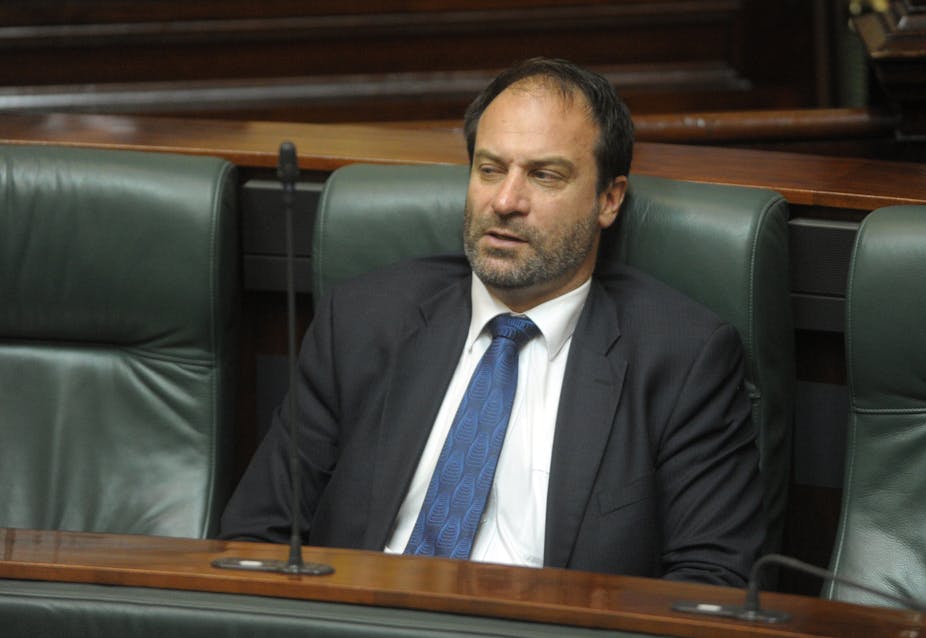After months of uncertainty, it appears that the Victorian parliament may have resolved the political crisis that had threatened to consume the government. The passing last night of a motion to suspend independent MP Geoff Shaw from the Legislative Assembly has effectively avoided further escalation of the stand-off. But what now for Victorian politics?
What happens to Shaw now?
Shaw is unable to take his seat in the Legislative Assembly until September 2, will be fined A$6838 and is ordered to apologise for his misuse of parliamentary entitlements. If Shaw fails to apologise by September 2, he will be held in contempt and expelled from the parliament.
Shaw says he has accepted responsibility for his transgressions and that it is his intention to return to the parliament in September. The punishment is the harshest meted out to a member of the lower house in 113 years. It must be hoped this sets an unambiguous standard for future parliaments.
Where does this leave the government?
Denis Napthine’s government has avoided the threat that could have left the Coalition facing a Labor gain in a by-election in Shaw’s seat of Frankston, leading to a potential deadlock in the Legislative Assembly. Little doubt exists now that the government will continue through to the November 29 election, when Napthine will attempt to secure a second term for the Liberal-National coalition.
However, the government has incurred significant political damage along the way. Victorians will want to see a return to stability and leadership in the coming months. The priority for the government will be to contain any further outbursts from Shaw and former speaker Ken Smith.
Has the issue damaged Napthine’s premiership?
The answer to this question is likely to settle on the question of integrity and whether voters believe Napthine has restored some to the government. It’s obvious Napthine would have preferred to be out selling the state budget along with the government’s case for re-election.
The Shaw affair has been an unwanted distraction for Napthine. H will be hoping for some clear air between now and the November 29 poll. As Shaw’s suspension was Napthine’s desired outcome it will be claimed as his achievement, which offers an opportunity to re-assert some legitimacy and authority to the government.
The next test for Napthine will be to leave the issue behind him and develop a strong narrative that government MPs can rally around.
Where does this leave Labor?
Labor did not secure Smith’s support for its amendment to find Shaw in contempt and expel him from the parliament, but will likely claim a moral victory.
The issue has received sustained media attention and while some will view Labor’s stance as opportunistic it has undoubtedly raised the party’s profile. Opposition leader Daniel Andrews will now want to remind the electorate routinely by connecting Napthine with Shaw wherever possible.
The challenge for Labor will be in maintaining this pressure on the government while avoiding the appearance of being overly negative. The extent of the political crisis has definitely given Labor a voice it previously did not have. What Andrews makes of this opportunity will likely have a direct bearing on the election.

How will this affect the November election?
The issue could still potentially overwhelm political debate as the election gets closer. With Shaw suspended, the numbers in the Legislative Assembly are tied at 43 apiece, with the Speaker required to give a casting vote on legislation not supported by Labor.
Napthine additionally faces a likely electoral backlash over the decision to build the controversial East-West road link ahead of major development for Victoria’s rail network. And if Shaw returns to the parliament in September this may result in further instability and inflict serious damage on the government.
How will this affair impact the Victorian parliament?
The greatest cost here is the obvious damage to the standing of the Victorian parliament as a fundamental institution of government. The political crisis has received so much attention that it will likely persist as a negative influence on public opinion of politics and the parliament.
In this respect, both the Coalition and Labor will have to work hard to re-establish some trust with voters.
More importantly, both parties need to think long and hard about important constitutional reforms in order to avoid another potential impasse in future. Previous constitutional changes in 2003, which codified existing Westminster conventions involving votes of no confidence, created a potential impediment to the effective functioning of democracy.
As I have previously argued, as long as there is an 88-member Legislative Assembly, it will be possible for deadlocks to occur. If similar political unrest is to be avoided it must be through further constitutional reform.

